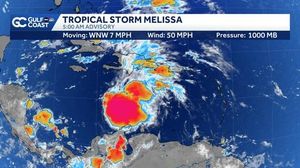At least five people have died in Madagascar following lightning linked to tropical cyclone Elvis, the latest phenomenon over the Indian Ocean. According to Mario Rajomazandry of CAJ News, no less than two others were injured as the harsh weather impacted the Vohibato district of the Haute Matsiatra region.
Cyclone Elvis formed on Tuesday, January 30, 2025, over the Mozambique Channel and moved past the western coast of southern Madagascar on Wednesday. At the time of publishing, Elvis was progressing south-eastwards over the southern-western Indian Ocean. By Thursday, its center was located approximately 80 kilometers south-west of Madagascar’s coast, with maximum sustained winds reaching 84 kilometers per hour, categorizing it as a tropical storm.
The local weather service has warned of continuing heavy rainfall and strong winds across southern Madagascar. "The local weather service predicts heavy rainfall and strong winds are expected over southern Madagascar," reported CAJ News. It is forecasted to strengthen from Friday to Saturday before dissipitating over the South Indian Ocean on Sunday.
While Southern Madagascar copes with the effects of Cyclone Elvis, it is also reeling from the impact of Cyclone Dikeledi, which earlier hit the region hard earlier this month, causing significant loss of life and displacement. Dikeledi brought severe rain and wind gusts, reportedly claiming ten lives and displacing thousands, as reported by the South African Weather Service.
Météo-France indicated the instability of the weather patterns affecting the region, stating, "Facing conditions not favorable to its intensification, the system could nevertheless reach tropical storm status." While this newly identified system posed risks, it was noted to remain well off inhabited islands.
The rainfall totals due to Elvis have been staggering, with Toliara and Taolagnaro recording five-day totals of 196 mm and 178 mm respectively. A peak 24-hour total of 93 mm was registered at Toliara. Aside from lightning fatalities, the storm brought persistent heavy rainfall to the southern parts of Madagascar.
Elvis's current wind speeds of 40 knots as of Thursday morning pose no immediate dangers to land, but more adverse effects are anticipated as the storm tracks southward. By the end of the week, it is expected to gradually lose its tropical characteristics. "Elvis regained strength... and remains at moderate tropical storm stage," reported Météo-France, indicating its capability of sustaining severe weather conditions for some days to come.
This steady stream of severe weather events raises concerns about the future of Madagascar, where climate-related challenges continue to mount. With years of increased storm activity, the region stands susceptible to hazardous weather events, threatening the livelihoods of the vulnerable population who consistently brace for these unpredictable natural disasters.
Authorities are now focusing on enhanced weather forecasting and community preparedness. A multidisciplinary team of meteorological experts has gathered for a week-long ‘testbed’ event, aimed at improving forecasting methods and disseminations of severe weather warnings. This initiative is to assess real-life scenarios impacting southern Africa and aims to save lives through early warnings and preparedness.
While everyone hopes for the best, the ever-increasing momentum of tropical storms threatens to wreak havoc on the region. Rainy days are expected to continue shaking Madagascar, reminding the world of the harsh realities of its climate paths. With Elvis on the horizon, the question remains what the lasting impacts will be for this southern African island, where weather patterns continue to challenge its people’s resilience.



